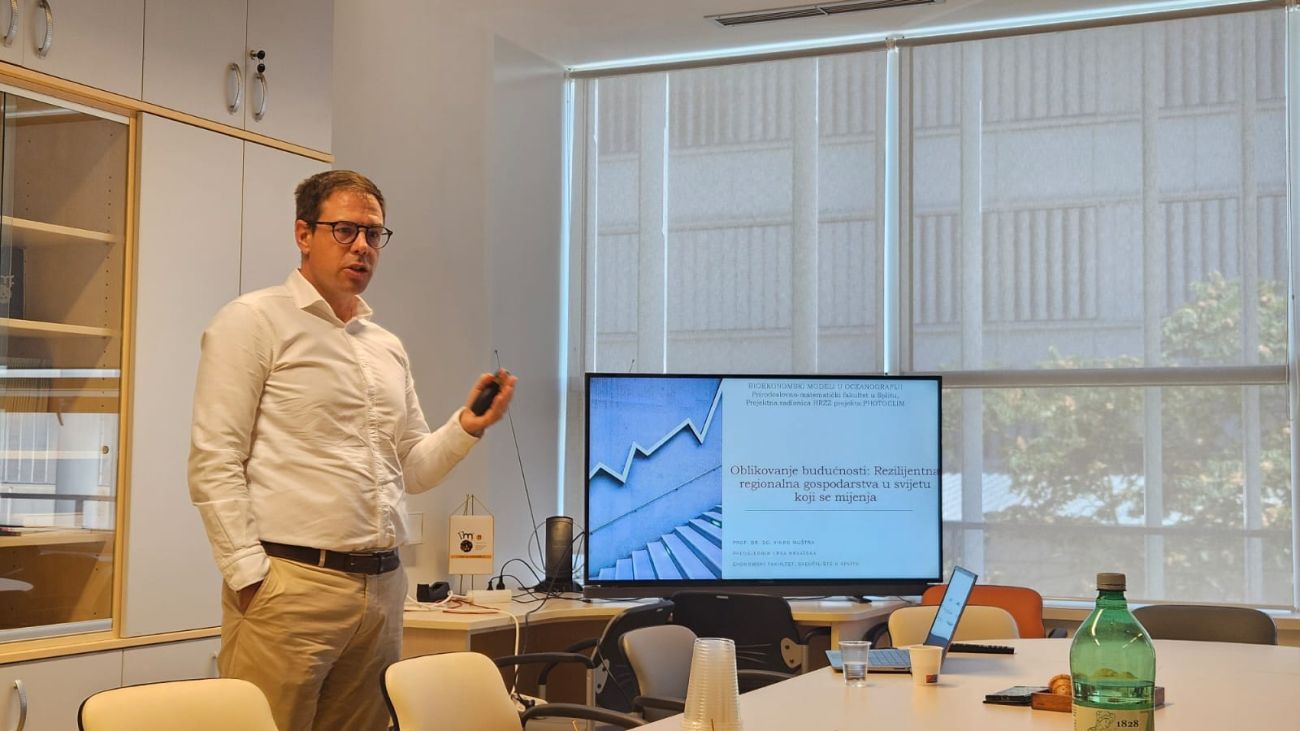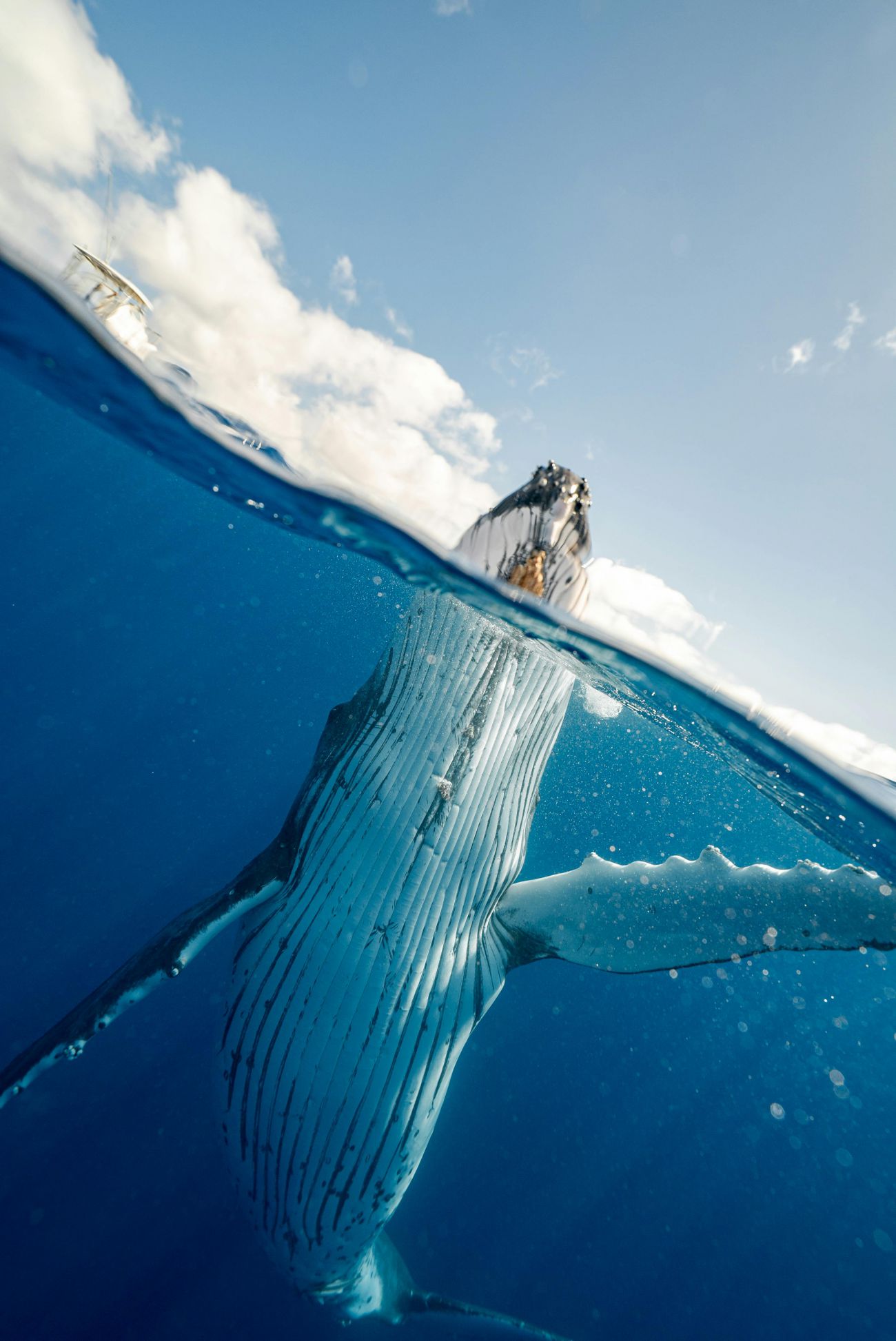Workshop on Bioeconomical models in oceanography
On the 5th September at the Faculty of Science we have held the Bioeconomical models in oceanography workshop. The workshop hosted experts from physics, biology and economics, which together discussed the topic of sustainable usage of marine resources in a changing world.
The workshop consisted of three sets of lectures, the first on physics, the second on biology and the third on economics. The opening lecture was given by Ivica Vilibić from the Ruđer Bošković Institute. Vilibić spoke about the physical foundations of climate change. while stressing the need for ongoing time series measurements and sustained observations of essential climate variables. He presented data from the Copernicus Climate Change Services, ranging from regional to global, highlighting the societal benefits of such datasets. Following Vilibić, Žarko Kovač from the Faculty of Science gave a lecture on the interplay between physics and biology in the ocean, with an outlook into economics. The talk was focused on the role noise and high frequency variability play in biophysical models. The effects of nonlinearities in the functional responses of biophysical models and the consequences they have for nonlinear dynamics in ecosystem models were discussed. Finally, the issue of correctly estimating marine primary production from the lens of ecosystem services was presented.

After the physics section, a series of three talks on biology were given by scientists from the Institute of Oceanography and Fisheries. The first lecture was on ecology and was given by Mladen Šolić. Šolić gave a talk on holarchy as the principle of organization in ecosystems. A historical overview of ecological thought was presented and parallels were drawn between the organization of human economies and ecosystems. Issue of sustainable development was discussed from both an ecological and societal standpoints. The need for cooperation amongst in facing climate issues was stressed. Also, the effect of climate change on ecosystem services was discussed. Following Šolić, Branko Dragičević gave a lecture on the topic of fish as indicators of climate change in the Adriatic. He spoke about invasive species, with an overview of historical findings, as well as novel ones. Trends in the numbers of invasive species in the Adriatic region were discussed. The final talk in this section was given by Sanja Matić Skoko, on the importance of addressing threats and challenges for fish nursery habitats. Matić Skoko spoke about the ongoing threats faced by many nursery habitats due to construction and tourism activities. The overuse of the costs for economic activities stresses the need for nursery habitat protection.

The final section was on economics where two lectures were given. The first lecture was given by Vinko Muštra from the Faculty of Economis in Split. Muštra spoke about the resilience of regional economies in the modern world. He drew parallels between the economic and ecological concepts of resilience, stability and fragility. A special focus was placed on the quantification and indices for measuring resilience. The final talk was given by Davor Mance from the Faculty of Economis in Rijeka. Mance presented his ongoing research on the environmental Kuznets Curve. He spoke about the parallels between the economic theory of growth and the biophysical models of primary production.

The final part of the workshop was cantered on discussions, during which a strong focus was placed on the interplay between physics, ecology and economics. Opportunities for new collaborations emerged, specifically in the transfer of mathematical methods across fields, such as for example the modern economic growth theory and the biophysical models of primary production, both have similar mathematical structures. Complementary to this, both the economics theory and the dynamical systems theory, heavily used in ecosystem modelling, would benefit greatly from exchange of ideas on system stability, resilience and anti/fragility. The mathematical tools of stochastic calculus developed in physics and economies, could potentially be transferable to ecosystem models. Finally, from the societal point of view, having accurate ecosystem models, which could be extended to include economic assessment for the value of ecosystem services would be of great value in oceanography. This was recognized as a goal for future research.
Detailed Schedule of the workshop is provided below:
8:30 – 9:00 Gathering and Opening Remarks
PHYSICS
9:00 – 9:30
Dr. Ivica Vilibić (Ruđer Bošković Institute, Zagreb)
Climate change: do we know where we are heading?
9:30 – 10:00
Assoc. Prof. Žarko Kovač (Faculty of Science, University of Split)
From physics, through ecology, to economics
10:00 – 10:30
Coffee break
BIOLOGY
10:30 – 11:00
Prof. Mladen Šolić (Institute of Oceanography and Fisheries, Split)
Holarchy – a principle of nature’s organization
11:00 – 11:30
Dr. Branko Dragičević (Institute of Oceanography and Fisheries, Split)
Fish as indicators of tropicalization and meridionalization of the Adriatic Sea
11:30 – 12:00
Dr. Sanja Matić Skoko (Institute of Oceanography and Fisheries, Split)
The importance of nurseries as essential habitats: challenges and threats
12:00 – 12:30
Coffee break
ECONOMICS
12:30 – 13:00
Assoc. Prof. Vinko Muštra (Faculty of Economics, Split)
Shaping the future: Resilient regional economies in a changing world
13:00 – 13:30
Assoc. Prof. Davor Mance (Faculty of Economics, Rijeka)
The Environmental Kuznets Curve
13:30 – 15:00
Discussion and Conclusions
15:00 – 17:00
Lunch
Presentations from the workshop are given below.





